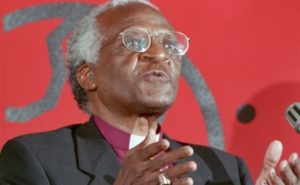Desmond Tutu – 2000 Delta Prize Recipient
At the turn of the 21st century, we are living in the midst of the greatest technological and soc ial revolution in human history. It is the transformation from a culturally partitioned world to a single interconnected global society whose many different countries are increasingly interdependent and increasingly heterogeneous. On a global scale the world’s diverse peoples find themselves interacting with each other as traders, as collaborators, as employers and employees, as partners and colleagues, and as neighbors.
ial revolution in human history. It is the transformation from a culturally partitioned world to a single interconnected global society whose many different countries are increasingly interdependent and increasingly heterogeneous. On a global scale the world’s diverse peoples find themselves interacting with each other as traders, as collaborators, as employers and employees, as partners and colleagues, and as neighbors.
What we are witnessing now is the desegregation of the world. The process of global desegregation will be difficult and lengthy, as is all desegregation, but the outcome, we hope, will be a healthier, happier, and more peaceful civilization.
The process of desegregation will be difficult, because individuals who once measured their own worth by their commitment to their tribe, ethnic group, or nation, in competition with other tribes, ethnic groups, or nations, find themselves having to share resources and space with people they once considered enemies. Although we might recognize that interdependence makes cooperation the best strategy for the well-being of all, many of these individuals, whose identity is rooted in their group allegiance, may view cooperation with longtime rivals as capitulation, even disloyalty. To these individuals, new neighbors are not new friends.
What the world needs in the 21st century are leaders who can show people who were once enemies the mutual advantage of their being friends, now that they are neighbors. Such leadership requires the ability to negotiate with respect, since, for the most part, the people of the world are good and honest citizens of their particular countries. It requires the ability to appreciate what the diverse groups have at stake–their longstanding identities. It requires understanding.
The Delta Prize for Global Understanding was established to honor “individuals or groups who by their own initiative have provided opportunities for greater understanding among cultures and nations.” We hope that the Delta Prize will come to signify the highest recognition for leadership in the promotion of peace and cooperation in the world.
The recipient of the Delta Prize for 2000, Archbishop Desmond Mpilo Tutu, demonstrates for the twenty-first century what such leadership entails to make a healthier, happier, and more peaceful civilization.
Archbishop Tutu has won international acclaim as a vigorous advocate of social justice. As General Secretary of the South African Council of Churches between 1978 and 1985, he set up procedures for providing assistance to the victims of apartheid. In this position he spoke out so strongly against the apartheid system that for several years he was prohibited by the South African government from traveling abroad. In 1995 he became chair of the Truth and Reconciliation Commission, appointed by President Nelson Mandela to adjudicate human rights violations perpetrated between 1960 and 1994. Three years later, after submitting the Commission’s final report, he joined the faculty of Emory University for a two-year term as the William R. Cannon Professor of Theology in the Candler School of Theology. He returned to South Africa in August of 2000.
Archbishop Tutu is the recipient of over fifty honorary doctorates and numerous other honors and prizes, including the Nobel Prize for Peace, which he accepted in 1984. He is also the author of six books, the most recent of which is No Future Without Forgiveness.
Archbishop Tutu was awarded the Delta Prize for Global Understanding on July 25, 2000 for his successful efforts to end apartheid and bring peace to South Africa.
